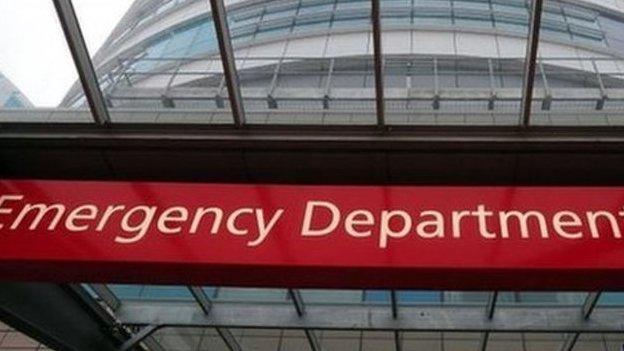NHS Health Check: A&E waits for January 'worst ever'
- Published
- comments

Record numbers of patients spent more than four hours in accident and emergency units in England in January, figures leaked to the BBC suggest.
During a difficult winter for the NHS, January appears to be the worst performing month in the past 13 years.
The figures also suggest record numbers of people waited longer than 12 hours for a hospital bed once seen in A&E.
The BMA said the prime minister could no longer "bury her head in the sand" over increasing pressure in the NHS.
And it accused the government of failing to grasp the seriousness of the situation.
But a spokesman from the Department of Health said the vast majority of patients were seen and treated quickly, and busy periods in hospitals were supported by an extra £400 million of funding.
This animation explains how the NHS system works, and what causes hospital blockages
The figures come from a document compiled by NHS Improvement, a regulator in England.
It appears to show that from a total of more than 1.4 million attendances at A&E during January:
82% of patients in A&E - rather than the target 95% - were transferred, admitted or discharged within four hours
More than 60,000 people waited between four and 12 hours in A&E for a hospital bed, after a decision to admit, known as a "trolley wait"
More than 780 people waited for more than 12 hours for a bed
It comes as official NHS figures for December show that 86.2% of A&E patients in England were dealt with in under four hours.
December A&E figures for Scotland are much higher at 92.6% while Wales and Northern Ireland's figures are lower than England's.
January's leaked figures for England are provisionally the worst monthly figures on record since the four-hour target was introduced in 2004.
The situation in England has worsened since last January when more than 51,000 people had "trolley waits" of between four and 12 hours in A&E and 158 people had waits of more than 12 hours.
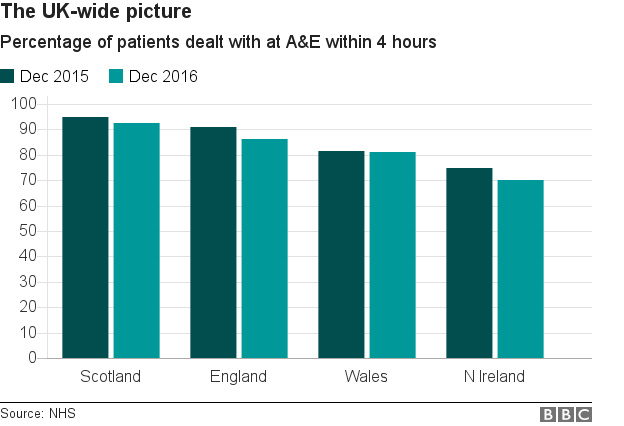

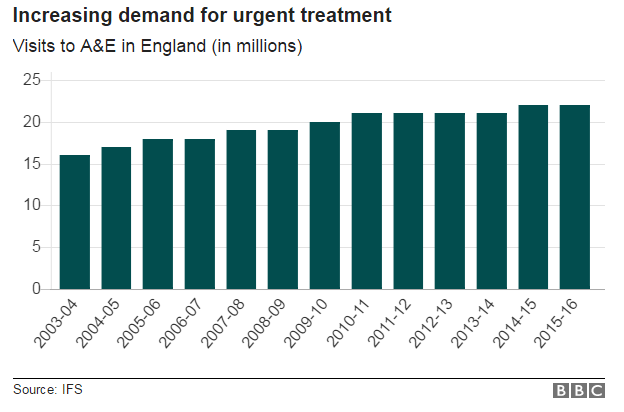

'My mother's 12-hour wait for a bed'
Jennifer's 95-year-old mother went into Norwich Hospital A&E with a bad chest infection at 9am and was still waiting for a bed until after 10pm on the same day.
She ended up in a ward, where she stayed for a couple of days - but not before being moved three times during the night.
"At the time I was very upset because there was no care or anything. I was so angry," Jennifer said.
"Previously she'd been to A&E on Monday 30 January but got sent home.
"It wasn't getting any better on the Wednesday, so the ambulance was called again.
"I know the NHS is in a bad way but it doesn't help a 95-year-old."

Health Secretary Jeremy Hunt recently suggested the four-hour target could be changed to apply to urgent health problems in A&E, rather than more minor ones.
A spokesman from the Department of Health said they did not recognise the figures.
"It is irresponsible to publish unverified data and does a disservice to all NHS staff working tirelessly to provide care around the clock."
Sorry, your browser cannot display this content.
But the Royal College of Emergency Medicine said their figures backed up those seen by the BBC.
Vice-president Dr Chris Moulton said: "While increasing numbers of doctors is vital, the more pressing problem is a lack of beds.
"We simply do not have any more room to put patients - we have the lowest number of acute beds per capita in Europe."
"As a result, bed occupancy is at dangerous levels and exit block is putting lives at risk."
President Dr Taj Hassan, told the BBC's Today programme that the more crowded emergency departments were, the higher the risk that patients could die.
"The care being delivered results in patients being compromised - because of delays in getting pain relief in time, getting antibiotics in time," he said.
"Delays to assessment will also compromise care," he added.
'Get a grip'
Dr Mark Porter, who chairs the British Medical Association council, said doctors had reported that this winter had been "extraordinarily tough" in hospitals.
"When social care isn't available, patients experience delays in moving from hospital to appropriate ongoing care settings - preventing patients being admitted at the front end in A&E," Dr Porter said.
And he said the long trolley waits were a sign of a system under too much pressure.
"The government have so far failed to grasp the seriousness of the situation," Dr Porter said.
"The prime minister cannot continue to bury her head in the sand as care continues to worsen.
"The government must urgently look at the long-term funding, capacity and recruitment issues facing the system as a whole if we are to get to grips with the pressures the NHS faces year in, year out, but which are compounded during the winter months."
'Unsustainable'
Chris Hopson, chief executive of NHS Providers, which represents hospitals, said it had already called for an urgent review of winter pressures on the health service.
"These figures have not been verified and should therefore be treated with caution, but they are in line with the feedback we have been getting from trusts.
"NHS staff have responded magnificently to increased winter pressures, but the situation has become unsustainable.
"The rise in long trolley waits is particularly worrying, as there is clear evidence they can lead to worse outcomes for patients."
Jim Mackey, chief executive of NHS Improvement, said the current level of demand in England's hospitals was causing real problems.
"Such intense pressure on emergency services has had a real impact on elective services and patients are having to wait longer for non-emergency treatment and this is also adding to the financial pressures being felt by NHS providers," he said.
"Even with these pressures, the NHS continues to outperform health systems in other major nations."

NHS Health Check

A week of coverage by BBC News examining the state of the NHS across the UK as it comes under intense pressure during its busiest time of the year.
- Published9 January 2017
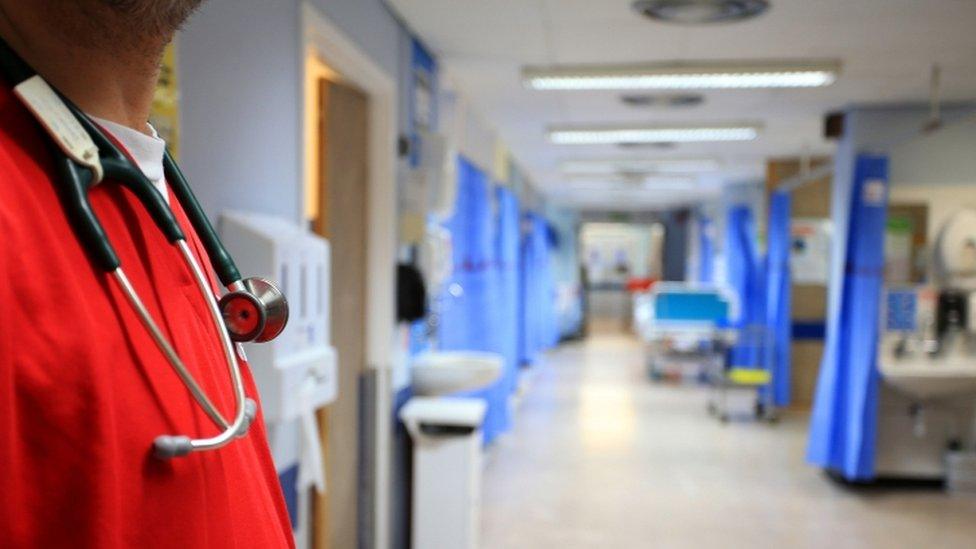
- Published7 January 2017
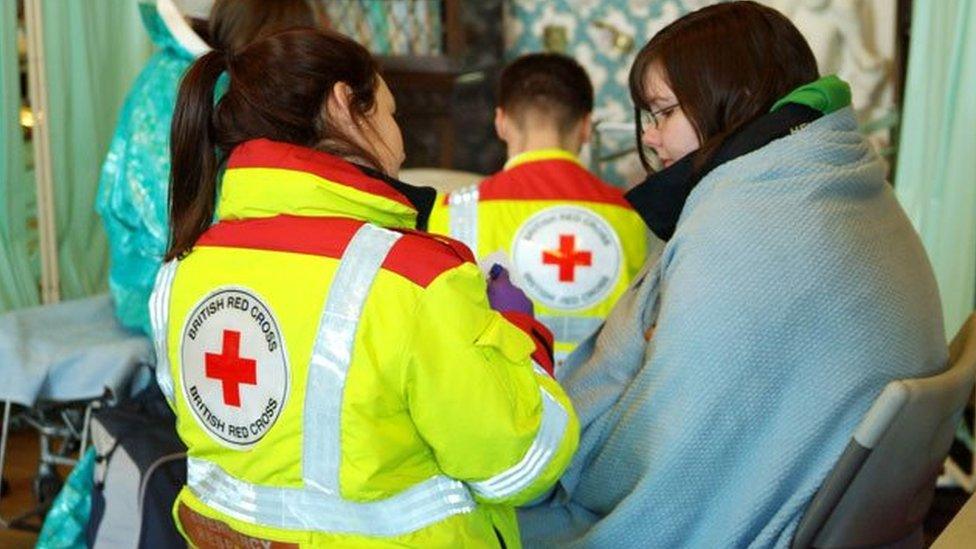
- Published9 June 2015
